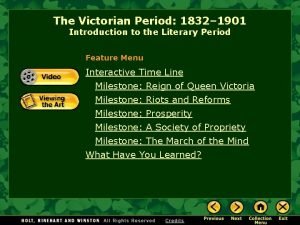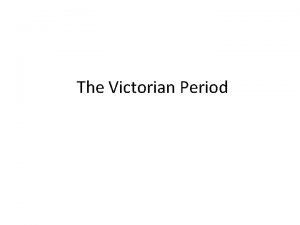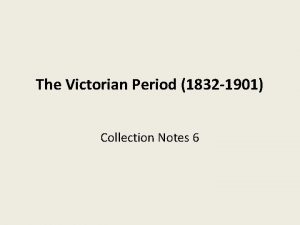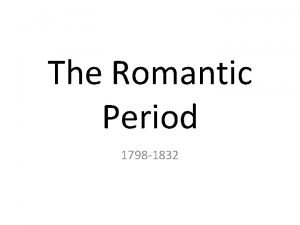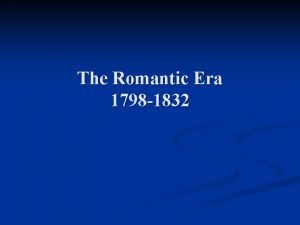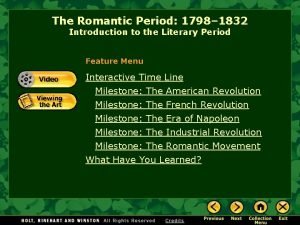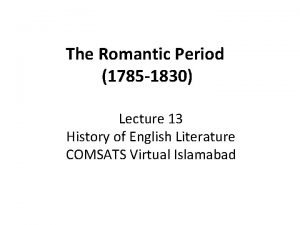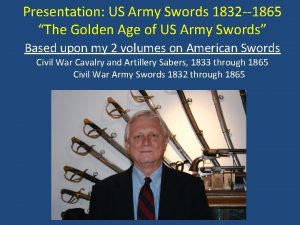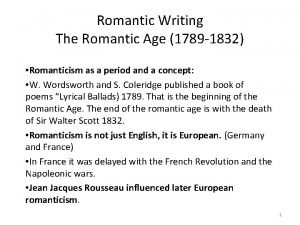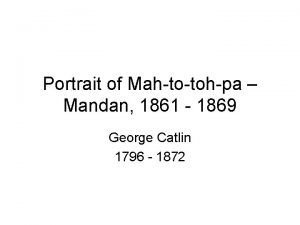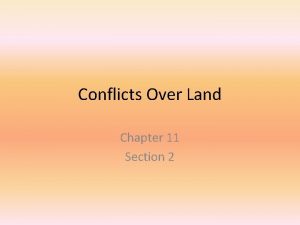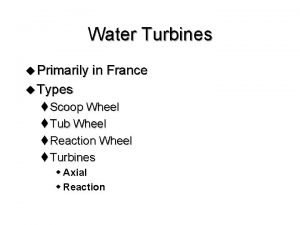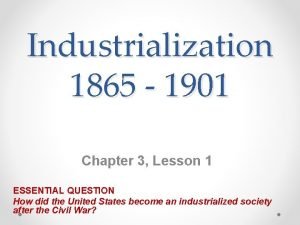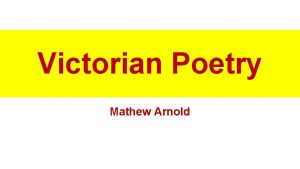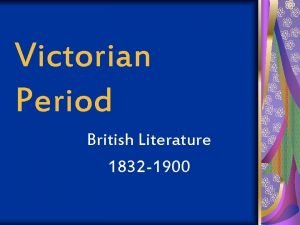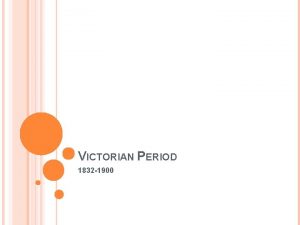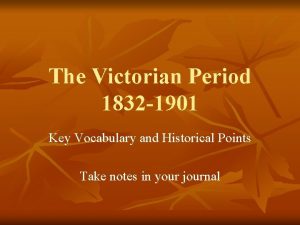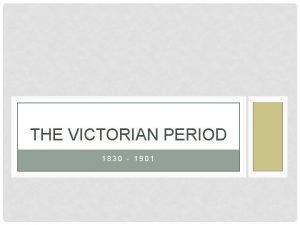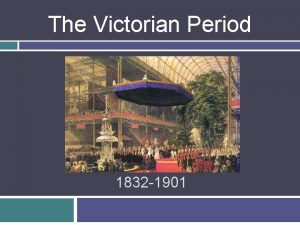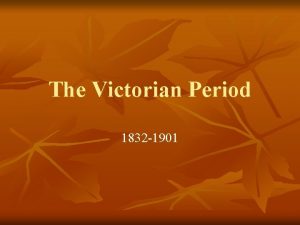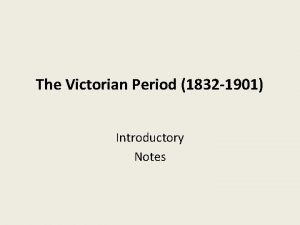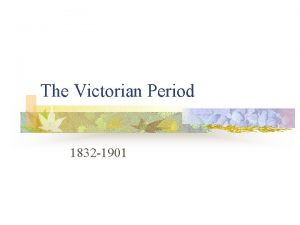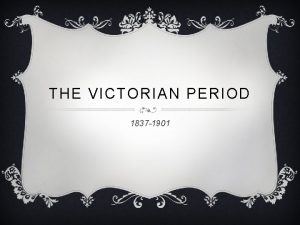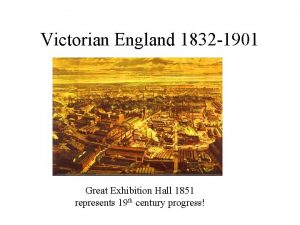THE VICTORIAN PERIOD 1832 1901 The Victorian Period





















- Slides: 21

THE VICTORIAN PERIOD 1832 -1901

The Victorian Period Named for the reign of Queen Victoria, Britain’s longest reigning monarch from 20 June 1837 until her death


The Victorian Period of stability and prosperity for Britain. British society extremely class conscious. Literature seen as a bridge between Romanticism and Modernism. Generally emphasized realistic portrayals of common people, sometimes to promote social change.

The Victorian Period It was a time of unprecedented demographic increase in England. The population rose from 13. 897 million in 1831 to 32. 528 million in 1901. 19 th century Britain saw a huge population increase accompanied by rapid urbanization stimulated by the Industrial Revolution.

The Victorian Period The Victorian era became notorious for the employment of young children in factories and mines and as chimney sweeps.

The Victorian Period Beginning in the late 1840 s, major news organizations, clergymen, and single women became increasingly concerned about prostitution, which came to be known as "The Great Social Evil".

Literature Much writing of the period reflected current social, economic, and intellectual problems: • • industrial revolution and its effects on the economic and social structure; rapid urbanization and the deterioration of rural England; massive poverty; growing class tensions; pressures toward political and social reform; the impact of Charles Darwin's theory of evolution on philosophy and religion; the early feminist movement.

The Greatest Age of English Fiction It was an age of immense and multicolored and often self-critical literary activity. The derogatory connotations of the term “Victorian”: • • • Narrow-mindedness Respectability Complacency are based on the actual attitudes and values of many members of the rapidly expanding Victorian middle class.


Charles Dickens 1873) (1812 - The greatest and most perfect Victorian storyteller. He gave English literature some of its most charming and amusing characters: Oliver Twist; David Copperfield; Nicholas Nickleby; His characters are really “humors” – exaggerations of one human quality to the point of caricature. His novels are all animated by a sense of injustice and personal wrong; he is concerned

George Eliot (1819 -1880) Pseudonym of Mary Ann Evans. Her strong personality and fine mind are in how she could draw characters and describe scenes with great skill. She also had pity and humor. Mill on the Floss, Silas Marner, Middlemarch and others. She is important because she is prepared to analyze human conduct, to show the moral consequences of even trivial actions – this makes her very modern - and to show the minds of even humble people can be made


The Brontë Sisters Charlotte Brontë (1816 -1855) wrote the masterpiece Jane Eyre that contains passion not to be found in earlier Victorian novelists. Emily Brontë (1818 -1848) had a more remarkable talent than her sister because her poems are vital and original and her novel Wuthering Heights is another story of wild passion. Anne Brontë (1820 -1849) wrote Agnes Grey and had less talent than her sisters and is


Lewis Carroll (1832 -1898) Pseudonym of Charles Dodgson. He explored the world of fantasy for the benefit of children, but was more at home in that than in Victorian Utilitarian England. Carroll’s Alice’s Adventures in Wonderland Through the Looking Glass have a mad Dickensian flavor with a curious undercurrent of logic.


Robert Browning (1812 -1889) One of the most eminent poets. He approaches in his language and imagery the poetry of our time. His writing is anti-romantic with railway-trains and cigars, and the language is often colloquial and even slangy. The poem My Last Duchess is a prime example of the dramatic monologue form.

The Victorian Period Matthew Arnold (1822 -1888) He was another prominent poet and essayist. He weighed down by the problems of his time, and much of his work is sad. His lyric poem Dover Beach reflects this anxiety and his inability to find rest. Oscar Wilde (1854 -1900) Gave drama wit in his admirable artificial comedy The Importance of Being Earnest. It is one of the most amusing plays ever written, a comedy of manners. Very often in Wilde’s work, the manner in which

Summary of the time In the first half of the 19 C the English became a nation of avid novel-readers. Poetry was popular but people wanted stories. Women had already triumphantly demonstrated their ability to compete successfully with their brother novelists, for example, George Eliot (1819 -1880). Contributing to a rapid rise in the popularity of the novels were the growth of a moneyed, leisured and educated middle class reading public, and an increase

Permission Acknowledgment My sincere appreciation goes to Ms. Ashwaq Basnawi for her generous permission to use her slides for LANE 341 course.
 Victorian age introduction
Victorian age introduction Victorian age
Victorian age Ceremoniality
Ceremoniality Victorian age 1832 to 1901
Victorian age 1832 to 1901 English-georgian period floral design
English-georgian period floral design Greek floral design history
Greek floral design history The romantic age (1798 to 1824)
The romantic age (1798 to 1824) The romantic period 1798 to 1832 summary
The romantic period 1798 to 1832 summary The romantic period 1798 to 1832 summary
The romantic period 1798 to 1832 summary The era of change 1798-1832
The era of change 1798-1832 Romantic age starts from
Romantic age starts from Romantic period timeline
Romantic period timeline Model 1832 dragoon saber
Model 1832 dragoon saber Bolton romanticism amp; politics 1789 1832 download
Bolton romanticism amp; politics 1789 1832 download George catlin (political scientist)
George catlin (political scientist) Salmo 1832
Salmo 1832 Black hawk 1832
Black hawk 1832 In 1832 the sauk chieftain
In 1832 the sauk chieftain 1832
1832 Heneral manuel tomenes
Heneral manuel tomenes Industrialization 1865 to 1901
Industrialization 1865 to 1901 1901 n. moore street
1901 n. moore street
